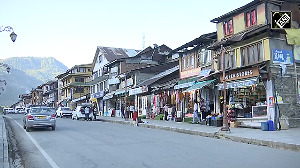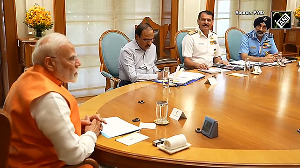'Religion. Nationalism. Corruption.'
'Jobs and achche din will pop up here and there as slogans, but these will be mere afterthoughts,' says Shekhar Gupta.

IMAGE: Prime Minister Narendra D Modi addresses a rally in Kailashahar, Unakuti district, Tripura. Photograph: PTI photo
Which is the defining political image of 2017? We have choices: Prime Minister Narendra D Modi flashing the 'V' sign after the Gujarat results; Rahul Gandhi in a Gandhi cap unfurling the Congress flag; a new Dalit President; a triumphant Amarinder Singh; Kejriwal blaming electronic voting machines; Yogi Adityanath, the Bharatiya Janata Party's rising star, breaking the Noida superstition to be there for the Metro's inauguration.
If you like complexities, you can choose Nitish Kumar at Vijay Rupani's swearing-in with other BJP and National Democratic Alliance chief ministers. It was in this decade that he wouldn't allow Prime Minister Modi to attend his own swearing-in.
You could also pick Lalu Prasad Yadav returning to jail, while his Twitter handle enjoys full chirping liberty.
My political image of the year is none of these.
It is Modi breaking down while speaking to the BJP parliamentary party after the Gujarat victory. I choose it because this defining image of 2017 will also define the politics of 2018 and script the battle of 2019.
This prime minister, more than any we have seen, is capable of keeping true emotion inside his chest.
His public appearances are carefully crafted and the emotion on display is carefully chosen. This outburst seemed spontaneous, or if I am allowed a near-hyperbole, a barely-controlled explosion.
The prime minister had sensed midway in the campaign that Gujarat was a fight. A few close seats going the other way, even if the BJP was still left with a majority, would have caused him enormous damage.
It would have revived the Congress at transition time, made it a stronger magnet for anti-BJP parties, and shaken a new and what's-the-best-offer ally like Nitish.
Modi's emotional burst, therefore, was an expression of relief as well as anger. This anger should define his politics going ahead.
While his party may use the alibi of a 22-year incumbency, it won't fool him. It was Gujarat's first election with him as prime minister.
Conventional anti-incumbency didn't apply in this case. His party in Gujarat had let things slip in just three-and-a-half years.
The state has had two chief ministers, one more ineffectual than the other. The party and the state government had failed to foresee or contain large, caste-based popular movements.
Agrarian anger had reached a level he could never afford. A new generation of popular leaders hostile and rude to him had risen in a state where traditionally even Congressmen were in awe of him.
All of this had happened in his own medium-sized state enjoying a remarkable domination of national power -- since both the prime minister and the BJP chief are Gujaratis -- and this is something no other state of this size has had yet.
If he couldn't take Gujarat for granted in his fourth year as prime minister, and if his party couldn't even deliver it, he was right to be angry.
He also understands the deeper issue. Overall economic growth has persisted below levels that produce a feel-good sentiment.
The unemployable young are as angry as the farmers. There is no quick-fix to a stalled economy.
- 'Gujarat result is a wake-up call for BJP'
- 'People don't trust Modi anymore'
- Why BJP lost rural Gujarat
- 8 reasons what went wrong for BJP in Gujarat
The one hope of kick-starting growth through interest rate cuts has reversed. In fact, bond yields have been rising, showing that the low-rate opportunity has passed us by.
Even if growth returns now, it will be too late to produce enough jobs to calm this frustration. And he considers them his most important constituency.
Next year will see him addressing these concerns in emergency mode and that will shape his politics. He also knows that his challenge ultimately came from the use of new caste groups, loosening his hold on Gujarat.
This part-success will be employed by his opponents everywhere now.
Politics will now be defined by the Gujarat election rather than Uttar Pradesh, which is more than three times bigger. Gujarat was all about Modi and Shah, yet ended up so closely fought.
In Uttar Pradesh, the BJP was against unpopular incumbents in a three-way contest. Gujarat is its home pitch.
Modi will apply conclusions from this near thing to 2019 and the 10 states going to the polls until then.
The first lesson is an old one. The BJP wins when Hindus vote together and not on a big-caste basis, as against small caste/sub-caste groups which Shah can socially engineer masterfully.
The central tussle in our electoral politics is: Can you re-stitch with faith what caste divided?
The Congress, with Jignesh, Alpesh, and Hardik, nearly won that in Gujarat. Modi-Shah don't want to see it again. So, expect more polarisation with Hindutva as its glue.
The triple talaq bill is the opening move. In marketing, this is called repositioning your competition.
Rahul will answer this with temple visits, but it will take some political genius to oppose the bill and escape the charge of minority appeasement.
It will be Tipu in Karnataka, and more such will be found, or invented, in Rajasthan and Madhya Pradesh.
While 'Vikas' will be the slogan, the BJP now knows for sure the economy isn't going to deliver jobs or votes in this term.
The fight against corruption may still have some electoral fuel. So the discourse will shift there.
There will be more raids and action on high-profile names and efforts will be made to fast-track some big corporate bankruptcies.
Modi's anti-corruption crusader's image has diminished with the acquittal of the 2G accused, and now, the seeming judicial dilution of the Adarsh case.
But his and his government's reputation is still free of the corruption taint.
Allegations that have recently surfaced do not stick, and the loose 'Adani-Ambani sarkar' jibes get re-tweets, but no votes.
Be surprised, therefore, if you don't see a renewed anti-corruption drive.
Corruption is a good issue, but the killer combination in electoral politics is religion and nationalism. We will see plenty of the latter.
History tells us that India unites behind the incumbent in periods of crisis despite its failures or even incompetence.
Recent examples are the Vajpayee and Manmohan Singh governments getting larger majorities within months of Kargil and 26/11, respectively.
Logically, you can foresee the crisis with Pakistan being ratcheted up, helped along by screaming commando-comic TV channels.
There will be a complication here, though.
Nobody knows what's on China's mind and what moves it will make at Doklam and elsewhere as the snows melt.
A crisis will be good for the incumbent as long as it can be contained and serious shooting doesn't begin. Or a victory can be claimed in the end.
This will be a challenge as the Modi government balances aggressive nationalism with India's strategic limitations.
The three engines of BJP politics going ahead will be religion, nationalism, and corruption.
You will sometimes hear about growth; jobs and achche din will pop up here and there as slogans, but these will be mere afterthoughts.
That's our reading of Modi's teary face image to define the rest of his term.
By special arrangement with ThePrint







 © 2025
© 2025